Illegal dumping continues in Detroit: How it happens and what's being done to fight it
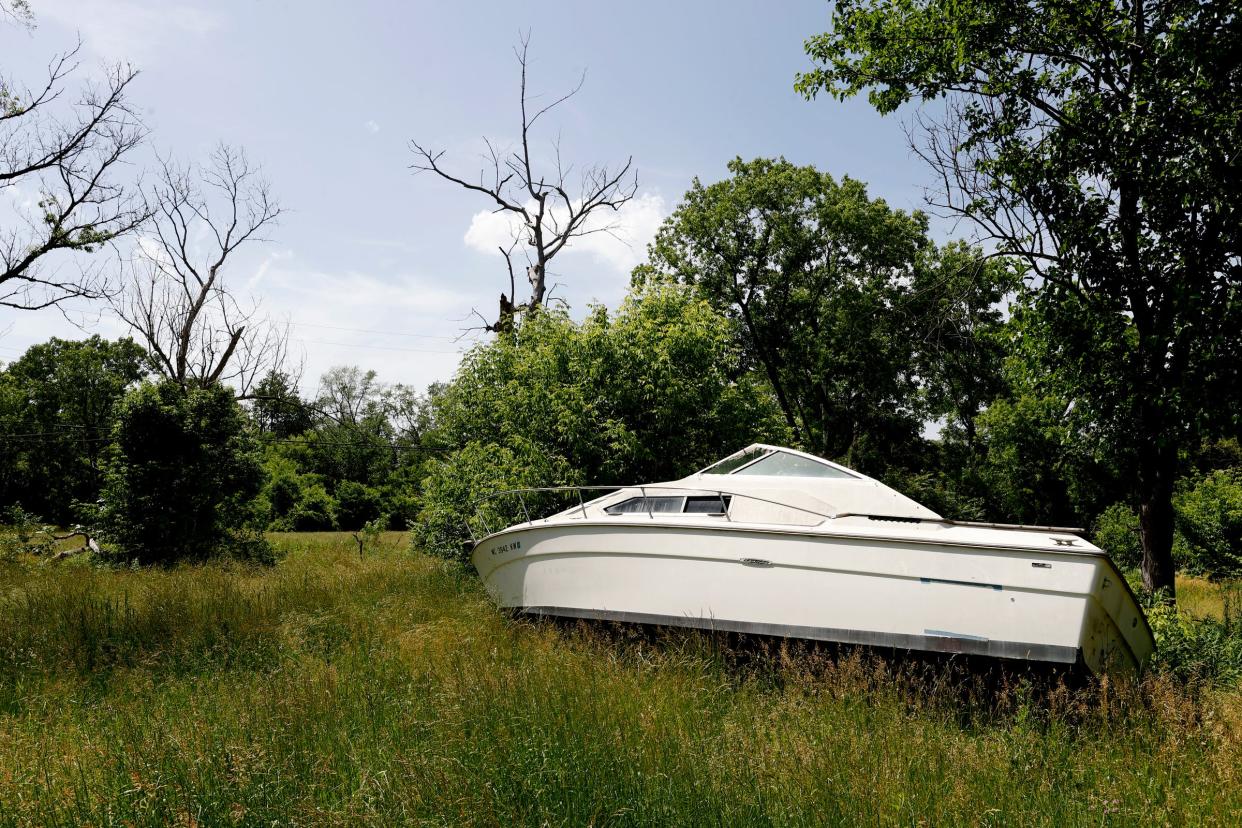
About 700 tons — about the same weight as 20 humpback whales — of illegally dumped materials are collected in Detroit each week.
That’s been a typical weekly haul for the city’s Department of Public Works (DPW) for about the last seven years, said Doug Collins, DWP superintendent. The department gathers glass bottles, tires, construction materials, yard waste, appliances, lots of tires — as many as 1,000 a week — and more from vacant lots and properties across the city.
Wrongly discarded materials heaped on vacant properties create neighborhood eyesores and pose potential health hazards.
“(Illegal dumping) is definitely an environmental justice issue when we think about classism and racism,” said Laprisha Berry Daniels, executive director of Detroiters Working for Environmental Justice. “It has to do with disinvestment in neighborhoods in Detroit. We find funding to fund the things that are important, and (efforts against illegal dumping) has not been something that has been prioritized.”
The city of Detroit operates a biweekly bulk pickup system, giving residents the opportunity to rid themselves of up to 2 cubic yards’ worth of bulk items. In an effort to help residents understand disposal rules, DPW is beefing up outreach and education campaigns, Collins said.
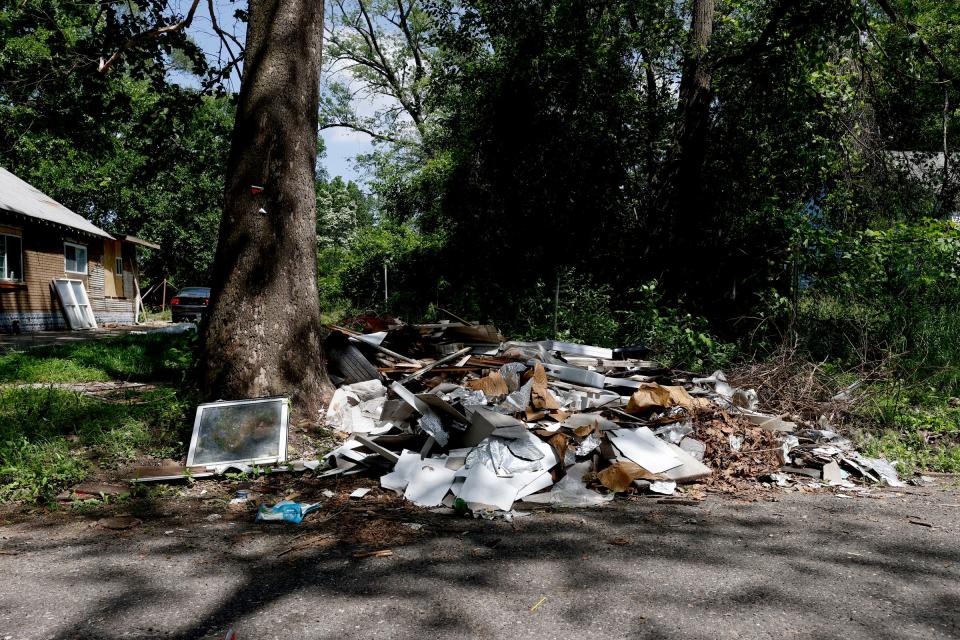
Some dumping is intentional — but the lack of information for residents about appropriate waste disposal can also contribute to the problem. So, to help you take out the trash — properly — we’re giving you the lowdown. Read on for background on who is illegally dumping in Detroit, how it affects residents, how fines and enforcement work, where and when to get rid of all of your large trash and more.
This article was produced in partnership with Outlier Media, a news organization that runs a text messaging service to share critical information with Detroiters. Text "Detroit" to 67485 for information and resources.
More: EPA: No level of nonstick PFAS compounds in water is safe for public health
What is illegal dumping?
City law prohibits putting or keeping bulk items anywhere without a permit — that includes leaving items out on the street for bulk pickup by the city without following city rules.
Appliances larger than the biweekly pickup size limit, construction materials and hazardous materials like paint and pharmaceuticals can’t be put in your regular trash or left for bulk pickup; instead, they must be dropped off at one of the city’s four drop-off locations. Whether it’s a stack of drywall or half-empty cans of paint, dumping these materials at vacant properties or anywhere else can put you out thousands of dollars in fines.
According to data from DPW, crews picked up about 16,326 tons of illegally dumped materials in 2021, about 3% more than in 2019. DPW has collected 11,371 tons this year as of mid-June.
Crews usually identify illegal dumping locations when they’re driving around or through the Improve Detroit app, where residents can report dumping and other issues to city officials. Reports can include descriptions of dumping suspects, which authorities can potentially use to identify dumpers. Dumping is also monitored by the Detroit Police Department (DPD). Since 2017, the city has installed more than 200 cameras across 55 dumping sites, and DPD reviews footage on a daily basis to surveil the spots for illegal dumpers, spokesman Rudy Harper said in an email.
If caught, people who illegally dump materials can be ticketed and fined. The cost of those fines depends on just how much is dumped and the number of offenses.
Who’s dumping in the city?
Collins believes much of the illegally dumped trash DPW hauls from vacant lots comes from a combination of two main sources: residents and contractors. After remodeling projects or simple home fix-ups, homeowners are often left with materials they don’t know what to do with. Some choose to get rid of it at already trash-ridden spots.
“I believe that the majority of the illegal dumping in the city comes from the residents in the city,” Collins said. “But a lot of people just don't know the rules, or they don't care to abide by the rules.”
Others have routinely suggested people living outside the city are responsible for the worst of dumping — in 2017, as DPD unveiled its dumping surveillance initiative, Mayor Mike Duggan said two-thirds of recent illegal dumping suspects were from the suburbs.
Harper said the DPD program has led to a reduction in dumping by people who don’t live in the city. “We have also noticed an increase in the request for additional dumping camera locations, as dumpers seek alternative locations to dump their garbage,” he added.
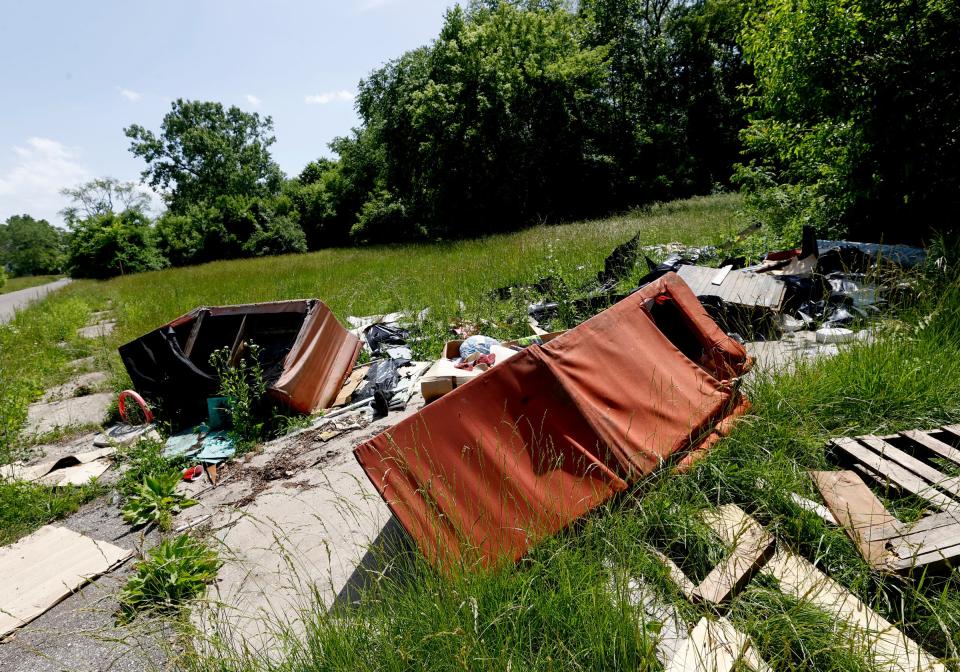
DPD’s surveillance system has allowed the city to identify and pursue action against illegal dumpers, with 63 criminal complaints submitted to the county prosecutor and 36th District Court between January and mid-May of this year. Of the 63 complaints, 75% were brought against Detroit residents.
Outlier’s review of the 1,100 illegal dumping blight violation tickets issued from January 2021 to May 2022 found that violators are pretty evenly split between Detroiters and people who don’t live in the city. Approximately 52% of tickets were issued to respondents at Detroit addresses. Of those Detroit respondents, nearly 40% were determined responsible for their violations and fined following a hearing.
More: It won't be easy for DTE Energy to retire huge, coal-fired Monroe power plant
Where does dumping occur?
Illegal dumping sites vary, but the city is aware of a few hot spots, including near Coleman A. Young International Airport on the east side and in Brightmoor on the west side. Vacant lots and properties also attract dumpers.
A review of illegal dumping reports on the Improve Detroit app submitted within the last three months found a mix of locations — near businesses, restaurants, alleyways and residential areas. But the city’s blight data focuses on citations and pinning down dumping suspects, rather than tracking where the dumping is taking place.
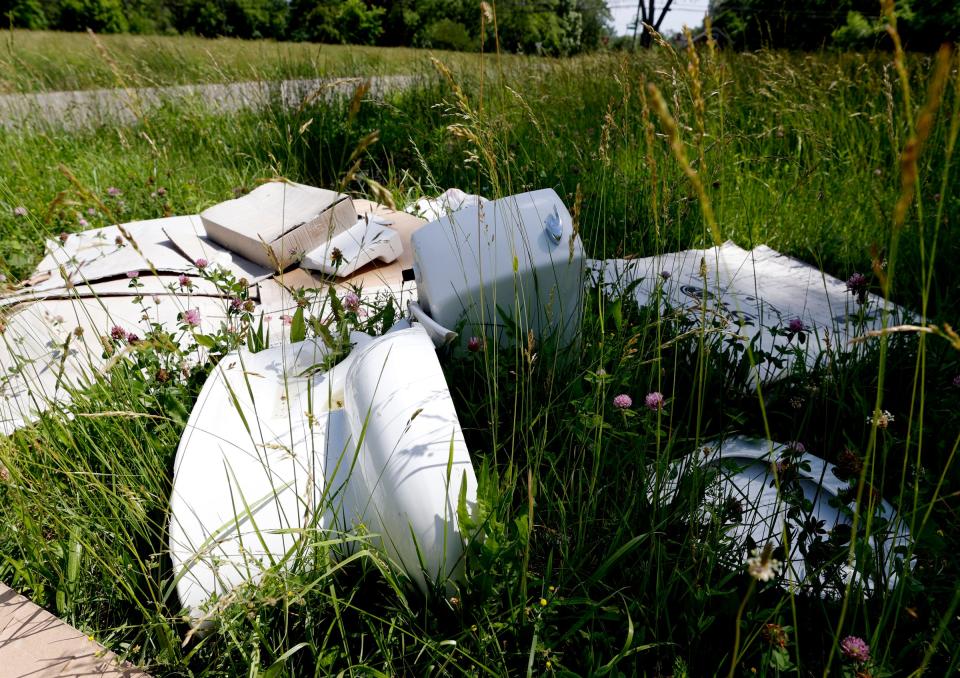
Neighborhoods that have little traffic, empty homes and vacant lots can pose as prime dumping sites because of the lack of watchful eyes, Collins said.
What’s the big deal with trash in a vacant lot?
One man’s trash is another man’s headache. Or the bane of his existence.
“Litter and garbage being in a space that is not aesthetically pleasing and well maintained does impact mental health,” said Daniels, the environmental group director. “At a point, it becomes the norm, and it shouldn't feel normal for you to walk out of your house and walk past vacant lots that have been strewn with bulk items of garbage.”
Scott Brines, 50, thinks of moving out of his Delray home of 15 years all the time, he said. He has had enough of the dumping in the southwest Detroit neighborhood, which is heavily industrialized and with many vacant lots. Despite countless volunteer neighborhood cleanups, dumpers keep returning.
“It's very depressing, and it makes people hate themselves,” said Brines, who is vice president of the Southwest Community Benefits Coalition. “It makes them hate where they live, and start disrespecting themselves.”
About a block away from his house sits a popular dumping site that is rarely clear of trash. Brines suspects it comes from out-of-towners looking to avoid dumping fees. Still, he continues to clean up his block, and he believes the neighborhood is worth the effort.
“There is beauty here,” he said. “I've cleaned up for years because I just care about the nature that's around me.”
So what do I do with my trash?
For biweekly bulk collection, residents are allowed 2 cubic yards of items (about the size of a refrigerator or stove). This might include furniture, appliances, or carpeting. Smaller items like lamps or children’s toys are required to be in plastic bags or boxes. Find your bulk pickup schedule here and more details about waste collection and when to put it out here.
If you place items totaling more than 2 cubic yards or weighing more than 1,000 pounds in front of your home on pickup days, the items won’t be collected and you may face a fine of $1,500 for the first three offenses — and up to $10,000 for fourth-time offenders.
The city also has three yards where Detroit residents can drop off bulk items and yard waste for free:
Southfield Yard — 12255 Southfield Road.
Davison Yard — 8221 W. Davison
J. Fons Yard — 6451 E. McNichols St. Note: Does not accept tires.
All three accept up to 1,000 pounds of yard and bulk waste and up to four tires per household per day. Items not accepted include:
Hazardous waste
Household garbage
Vehicle parts
Building materials
Remodeling, construction, and demolition debris
The yards are open Monday through Saturday with varying hours by season.
Recyclable items including styrofoam, metals, and batteries can be dropped off on Mondays, Wednesdays and Saturdays at the Recycle Here! facility located at 5960 Lincoln St. For more information on recyclable drop-offs, visit their website.
Hazardous materials like pharmaceuticals, paint and batteries can be dropped off for free at the Household Hazardous Waste Receiving Facility at 2000 E. Ferry St. The facility is open on Thursdays and the fourth Saturday of each month.

For a fee, DPW will also pick up bulk materials that can’t go in regular collection from your property. Get an estimate by calling 313-876-0004.
For a fee starting at $65 for the first 1,000 pounds, some unaccepted items can be taken to the J. Fons Transfer Station. That station accepts household garbage, hazardous waste and construction materials.
What do I do if the city doesn’t collect my trash or bulk pickup?
Report a missed collection to your provider. Detroit contracts with two separate companies for collection, Waste Management and GFL Environmental. Find which company is responsible for your area here.
GFL: 844-GO.GFLUSA or 844-464-3587
Advance Disposal: 844-2-DETROIT or 844-233-8764
You can text your address to 313-800-7905 for trash and recycling reminders to make sure you don’t miss your pickup day.
What should I do with recycling and yard waste?
Unlike recycling, which is offered year-round to Detroiters, yard waste is only collected April through December. Yard waste is limited to grass clippings, leaves, twigs and branches.
Residents are required to package grass and twigs no more than 2 inches in diameter in either paper waste bags or a reusable, 32-gallon plastic or metal container marked with the words “Yard Waste Only.” Thicker branches and twigs up to 4 feet long and 4 inches in diameter have to be bundled, tied, and weigh no more than 60 pounds.
When pickup day comes, yard waste should be placed 6 feet away from your trash and recycling containers.
Recyclables on the other hand require no extensive packaging. Items like milk jugs and pop cans can be thrown straight into the container.
Individuals who live in single-family homes or buildings with four units or less can request a free recycling container by filling out this form. The city also operates a commercial recycling program for larger apartment buildings and businesses.
Though tempting, plastic bags — think Kroger or Meijer bags — are not accepted during weekly recycling pickups. Neither are paper towels, napkins, any soiled material (including pizza boxes) or garbage of any type.
What are the consequences of illegal dumping?
Fines for illegal dumping are determined based on the amount and number of offenses, according to DPW:
Less than 5 yards: First offense is $200 and repeat offender is $500
5-10 yards: First offense is $500 and repeat offender is $1,000
10 yards or more: First offense is $1,000 and repeat offender is $2,500
If a vehicle was used to dump illegally, the vehicle is impounded and held until the fine for dumping is paid in full.
What are my other responsibilities when it comes to debris at my property as a homeowner or renter?
A Detroit property owner’s responsibility extends well beyond the home itself — specifically, it extends from the middle of the street in front to the middle of the alley behind the property. This includes keeping your home clear of bulk items, weeds, and litter.
Skipping yard cleanup, whether it’s your dog’s waste or old furniture, can get you a ticket for blight. That vintage car sitting with a flat that you swore you'd rehab? That could cost you a ticket, too.
What do I do if I get a ticket for illegal dumping?
If you get a blight ticket for illegal dumping, you have two options:
Admit responsibility and pay the fine and fees before the scheduled hearing date and get a 10% reduction for early payment, or
Attend the hearing and contest the ticket, with or without an attorney.
If you’re found responsible, the fine and fees have to be paid by the hearing date, or you’ll be hit with a 10% penalty for late payment. If you ignore the ticket and fail to appear at the hearing, you’re determined responsible by default and your fine will eventually be sent to collections.
In case you overlooked a blight ticket or accidentally missed your hearing and are determined to be responsible by default, you can file a motion to set it aside within 21 days.
After a decision has been issued following a hearing, it can be appealed to the Wayne County Circuit Court within 28 days of the order. You must appear at your original hearing, meaning citations that have been ignored can’t be appealed.
For more information on blight tickets and your responsibilities as an owner or occupant, go to the Department of Administrative Hearings’ website.
What do I do if I see illegal dumping?
Citizens can report illegal dumping, whether in progress or after the fact, in three ways:
Submit a report through the Improve Detroit app
Call the Telephone Crime Report Unit at 313-267-4600
Call or make a report in person at any DPD precinct
To submit a report through the Improve Detroit app, you’ll be asked to include a photo of the dumping, an address and description of the materials that were dumped and the type of property where it occurred. For illegal dumping in progress, the app also asks for details that could lead to the identification of the perpetrator including a description of the person or vehicle information.
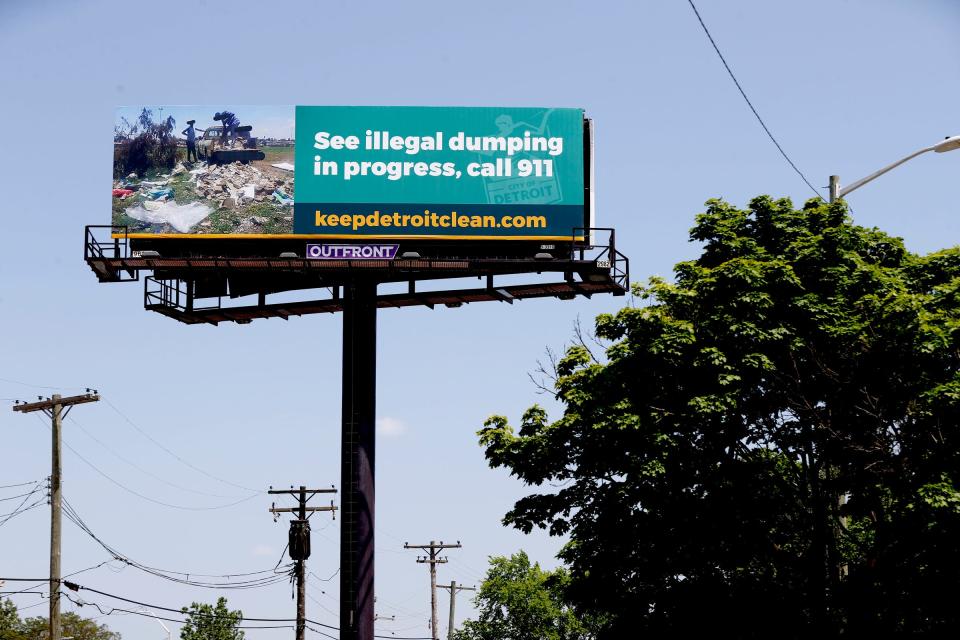
For more information on bulk disposal and illegal dumping, go to the Detroit Department of Public Works’ website.
Contact Miriam Marini: mmarini@freepress.com or miriam@outliermedia.org.
This article originally appeared on Detroit Free Press: Detroit's illegal dumping problem: Q&A on fines, where to bring trash

